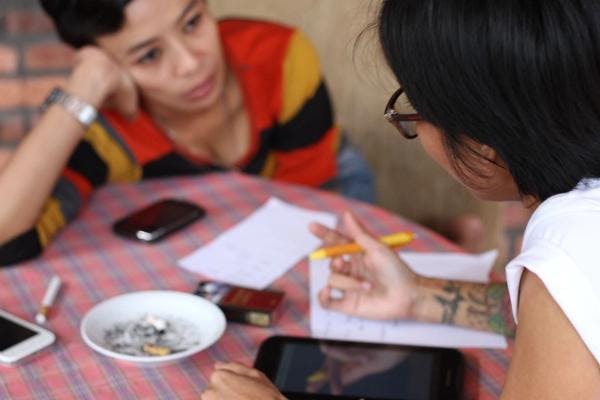Toward gender equality in harm reduction: Innovations in Ukraine, India and Indonesia
By Claudia Stoicescu, Consultant at IDPC & Postdoctoral Researcher at Columbia University
Women who use and inject drugs continue to be left behind. Compared to men who use drugs, women have consistently lower access to harm reduction services and are less likely to engage in drug treatment. Although HIV programmes, including harm reduction services, may not intentionally discriminate against women, they often fail to address their gender-specific risks and needs. Women face greater discrimination than men and added stigma, fuelled by international drug policies, and exist in an environment rife with gender-based violence and inequality. These overlapping vulnerabilities make women more susceptible to HIV, yet they remain largely unrecognised in responses to the HIV epidemic among people who use drugs in many countries.
However, the elimination of gender inequality in health status and health care is a major objective of the 2030 Agenda for Sustainable Development adopted by world leaders in 2015. SDG Goal 5 is aimed at achieving gender equality and empowering all women and girls, while Goal 10 aims to reduce inequality within and among countries. The 1979 Convention on the Elimination of All Forms of Discrimination against Women (CEDAW) requires that states “eliminate discrimination against women in their access to healthcare services throughout the life cycle.” This means eliminating discrimination against all women, including those who use drugs, as well as protecting and respecting their human rights.
Through initiatives implemented by community-based organisations (CBOs) and community-led networks in India, Indonesia, and Ukraine, lessons and good practices can be drawn where there are promising approaches that seek to empower women who use drugs and promote their health and well-being in the context of the international HIV response.
Ukraine
The Alliance for Public Health led the Capacity Development for Quality-Assured Gender-Sensitive Harm Reduction Interventions (ProfiGender) project starting in 2016. The project was implemented five regions in Ukraine in collaboration with local HIV service CBOs Viktoriia Resocialisation Center (Khmelnytskyi); Return to Life (Kropyvnytskyi); The Way Home (Odesa); Convictus Ukraine (Kyiv); and Public Health (Kryvyi Rih).
ProfiGender is a structural intervention focused on developing, testing, and implementing gender-sensitive approaches to harm reduction service delivery.
While models and definitions vary, gender-sensitive programmes recognise that societal gender roles and gendered socialisation affect the way drug-using women interact with service providers, as well as with male peers. Such programmes adopt a person-centred approach that seeks to empower women to come forward, without reinforcing stereotypes about women and drug use.
Profigender was successful in increasing uptake and retention of women who inject drugs in harm reduction services, and resulted in improved knowledge, communication and attitudes of service providers toward drug-using women, and improved HIV-related knowledge and testing and strengthened confidence and self-esteem among women who use drugs.
India
The Women Initiating New Goals for Safety (WINGS) intervention was implemented since April 2017 by the India HIV/AIDS Alliance, with support from Frontline AIDS and in collaboration with CBOs Sahara Aalhad (Pune), Ganga Social Foundation (New Delhi) and Nirvana Foundation (Imphal, Manipur).
WINGS is an evidence-based screening, brief intervention, and referral to treatment tool that addresses the co-occurring epidemics of gender-based violence and HIV among women who use drugs.
The main take-away from WINGS is that integrating a gender-based violence intervention with harm reduction programming is possible and has resulted in improved outcomes for women in terms of reductions in violent incidents and drug-related risks, as well as increased empowerment, coping skills and harm reduction service uptake. To date, WINGS has been adapted and implemented as part of a range of HIV and harm reduction programmes in 6 countries and 8 languages.
Indonesia
The Indonesia case study describes approaches employed by the Indonesian Drug User Network in partnership with academic institutions and local CBOs, to promote broader reach, meaningful engagement, and empowerment of women who use drugs between 2015 and 2018. These approaches included forming academic-community partnerships and conducting participatory community-based research to understand women’s unmet needs and inform programmatic and advocacy priorities, and empowering community women leaders by facilitating the formation of the Indonesian Women Drug User collective.Through the latter initiative, participating women developed strategies to reach and mobilise their peers and supported women to think of themselves as part of a community, strengthen their capacities and abilities, and use their voice to demand human rights. Their efforts resulted in greater representation of marginalised women in research and visibility of issues important to women who use drugs in public forums.
***
Together, the three case studies underscore the importance of applying tailored methods to better reach and meet the needs of women who use drugs and of supporting women themselves to participate meaningfully in the programme design, implementation, and evaluation.
Unfortunately, the sustainability of these initiatives is threatened by shrinking support for harm reduction from international donors and continued lack of prioritisation of to drug-using women’s needs globally. In each of the case studies detailed here, implementing organisations have had to discontinue or scale down their reach and range of approaches due to funding constraints, illustrating the urgent need for long-term dedicated financing to develop and take women-focused programming to scale.
These promising strategies are complementary to the gender-sensitive comprehensive harm reduction package outlined in the 2016 UNODC Practical Guide for Service Providers on Gender-Responsive HIV Services. They show how countries can work towards achieving the commitments made towards the 2030 Agenda, including the 17 SDGs, and the 2016 UN Political Declaration on HIV and AIDS in relation to women who use drugs, thus delivering on their pledge to leave no one behind.
For more information about the case studies, contact Ancella Voets at Frontline AIDS (avoets@frontlineaids.org)
